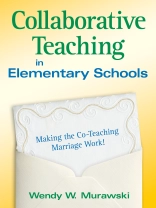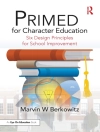‚A comprehensive resource for co-teaching teams and their administrators! It is full of ready-to-use, teacher-friendly forms, checklists, and charts. The co-teaching lesson plan forms are phenomenal! The number of practical ideas included is astounding.‘
—Michele S. Dalton, School Psychologist
Poudre School District, Ft. Collins, CO
‚While the analogy of a marriage is cute, it also works as a metaphor for co-teaching at all levels. The process of getting to know each other, deciding to co-teach, making it work, and possibly having to end the co-teaching relationship all become easier to understand using the metaphors of dating, engagement, and counseling.‘
—Claire E. Hughes, Associate Professor of Special Education
College of Coastal Georgia
Say ‚I do!‘ to greater learning success for students at all levels!
Using the metaphor of marriage, this lighthearted, highly practical, and teacher-friendly resource from the author of Collaborative Teaching in Secondary Schools provides readers with the tools to successfully set up, conduct, and successfully maintain co-teaching partnerships in any learning environment.
Based on the author′s extensive experience, this book blends solid educational research and literature with lighthearted humor to help readers nurture co-teaching partnerships through the stages of co-planning, co-instructing, and co-assessing. Divided into four relationship stages, each section offers:
- Case studies and scenarios of co-teachers in action
- Field-tested instructional and behavioral strategies with authentic examples
- Self-assessments to determine teachers′ readiness to proceed to the next step in the co-teaching relationship
- Information on the role of the administrator and how to communicate with parents
- Numerous reproducibles, helpful Web sites, and a list of teacher resources
Collaborative Teaching in Elementary Schools is an easy-to-access, one-stop guide for schools getting started with co-teaching or looking to refine their existing programs.
Inhaltsverzeichnis
About the Author
Introduction: Why This Book?
Part I. The Dating Scene
1. Understanding What It Means to Be in a Relationship
Defining the Terms
Changing the Mids of the Commitment-Phobic
2. Dating, Living Together, and Marriage
Recognizing the Continuum of Options
Going in With Eyes Wide Open
Do′s and Don′ts of Co-Teaching
3. General Educators Are From Jupiter, Special Educators Are From Saturn
Recognizing Different Frames of Reference
The Second Time Around: Getting Over Bad Experiences
Self-Assessment 1: Are We Ready to Date?
4. Matchmaker, Matchmaker: The Role of the Administrator
To Marry Them or Not to Marry Them: Determining Whether to Use Co-Teaching
Part II. The Engagement
5. Getting to Know Your Partner
Drinking Out of the Carton (and Other Pet Peeves)
Ensuring Parity
Who′ll Do the Laundry? Setting Roles and Responsibilities
6. Registering for the Wedding
Identifying Our Needs
Communicating With Stakeholders
7. Discussing the Future
Establishing Schoolwide Improvement Goals
Establishing Individual Team Improvement Goals
Self-Assessment 2: Are We Ready to Get Engaged?
8. Matchmaker, Matchmaker: The Role of the Administrator
Avoiding Arranged Marriages: The Search for Soul Mates
Part III. The Wedding
9. For Better or Worse: Establishing Norms for Behavior and Academics
Physical Issues
Classroom Management Issues
Instructional and Assessment Issues
10. For Richer or Poorer: Sharing Space and Materials
Sharing Space
Sharing Materials
11. Planning Quality Time Together: Why, When, and How to Plan
Why Should We Co-Plan?
When Shuold We Co-Plan?
How Should We Co-Plan?
Self-Assessment 3: Are We Ready to Marry?
12. Matchmaker, Matchmaker: The Role of the Administrator
Avoiding Polygamy: Too Many Is SImply Too Many (When Scheduling)
Part IV. The Marriage
13. Working Together to Wrangle the Li′l Rascals
Five Practical Approaches for Co-Instruction
Approach 1: One Teach, One Support
Approach 2: Parallel Teaching
Approach 3: Station Teaching
Approach 4: Alternative Teaching
Approach 5: Team Teaching
14. Teaching the Seven Dwarves
Understanding Differentiation
Practical Strategies for Differentiation
15. Are We Successful Yet?
Co-Assessing Us and Them
16. Playing Nicely With the Other Parents
Co-Teaching′s Role With Other School-Improvement Initiatives
Reading First
Cooperative Learning
Twenty-First-Century Technology
Universal Design for Learning
Response to Intervention
Self-Assessment 4: Will We Be Able to Celebrate Our Anniversary?
17. Matchmaker, Matchmaker: The Role of the Administrator
Is It Time for a Divorce?
Building an Effective Program: Making More Matches
Appendix: Keeping the Honeymoon Going
References
Index
Über den Autor
Wendy W. Murawski, Ph.D., MBA, MEd, Ed S, is the Executive Director and Eisner Endowed Chair for the Center for Teaching and Learning at California State University, Northridge (CSUN), where she is also a Full Professor in the Department of Special Education and the Director of SIMPACT Immersive Learning. Dr. Murawski is the national Past President of the Teacher Education Division (TED) of CEC and an internationally known speaker and author, presenting in Europe, Asia, Africa, and North America. Her research focuses on co-teaching and inclusive practices nationally and internationally. She has published extensively around inclusive education, co-teaching, collaboration, and Universal Design for Learning, to include 18 books and numerous chapters, blogs, and peer-reviewed articles. She is the CEO of 2TeachÒ Global (www.2Teach LLC.com), an educational consulting company dedicated to promoting inclusive education around the world. In her personal life, Wendy enjoys traveling with her husband, learning languages, reading, drinking merlot, seeing movies, going to Book Club, visiting her college-bound son Kiernan, and pretending she is going to work out.












